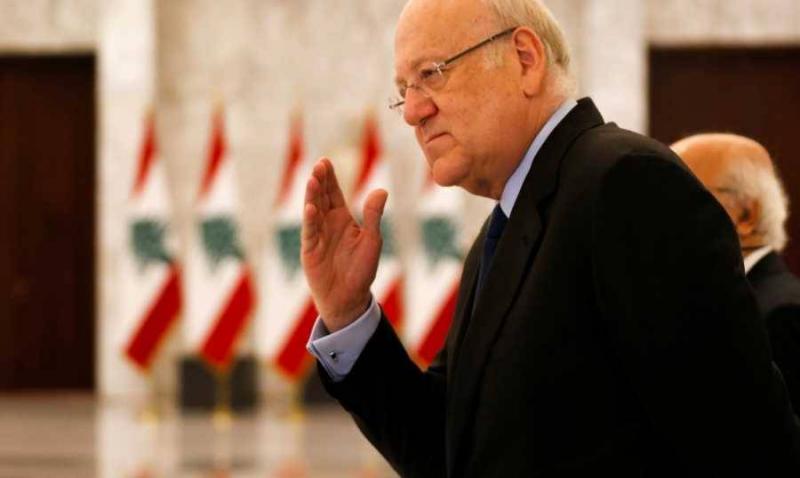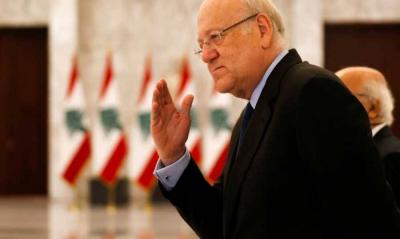The speed with which the designated president presented a slightly altered cabinet formation to the president of the republic—rightly so—might foreshadow a delay rather than a quickened formation of the government, as he decided to put the ball in President Aoun's court from the very beginning. This current government, whether operating with full powers or in a caretaker capacity, is not worthy of remaining to accompany the end of the term, nor is it qualified to bear the responsibility of legitimacy in the event of a presidential vacancy. The issue is not about its president or the level of its ministers, among whom are serious, active, and ethical individuals, but rather about its political composition leaning towards the axis of resistance, despite the moderation of its president. Hence, the country needs a new “reserve government” with its ministers, national balances, and rotation of portfolios, rather than patching up and repairing this government. We are not advocates of using worn-out governments. Were it not for the transitional and decisive circumstances we are in, the situation might have been more bearable. However, each day carries developments and events that affect the fate of Lebanon's unity. If we are unable to form a new government, establish a stable parliamentary majority, and elect a president of the republic, then what remains of the democratic system, the unity of the Lebanese entity, the coexistence formula, and the central state? "Let us weep for the memory of a beloved and a home." The attempt to revive the resigned government is a new piece of evidence we provide for ourselves and the world, confirming that today’s Lebanon has become a failed state. We are experiencing an existential and partnership crisis more than a mere system and reform crisis. The people, the ruling system, and the political forces have successively wasted all the saving opportunities presented to Lebanon: from international resolutions and the "Baabda Declaration," through the "revolution" and reforms, to parliamentary elections and Arab and international initiatives. The structure has become too difficult to salvage without re-engineering it. Lebanese unity has become a special, multi-sectarian and cross-regional canton that compresses Greater Lebanon. How can the hoped-for unity be realized when all its essential components have been dismantled and replaced with elements of division? If unity is not ahead of us, we will not find it behind us. We are a people in dispute over the present and the century, divided over defining its enemies and friends, its entity and identity, its national constitution and role, the structure of the state and the margin of sects, the borders of the homeland to the south, east, north, and west, neutrality and bias, food and drink, grape clusters that are halal in the vineyard and a haram glass on the table, veils that conceal the face and unveiled bodies, the freedom of man and his rights and intimate inclinations. All these disputes surface at every meeting, achievement, or government, and we envelop them in political conditions. Regional and global issues may find solutions, yet we remain in Lebanon without a resolution to our existential problems. The Lebanese body has developed a sensitivity towards constructive solutions because some of its components hide destructive solutions. The state of Lebanon had detonated before the explosion of the Beirut port; here lie the reasons for the incapacity and crisis of government formation. A century has passed, and a hundred days remain. These serious facts are sufficient to urge believers in the restoration of Lebanon to prevent the axis of resistance from dominating the upcoming government, participating in a new formation that respects the comprehensive rotation of portfolios and is based on a sovereign ministerial statement. When the Maronite Patriarch wished last Sunday for the sovereign forces to participate in the government, he linked it to “the designated president forming a government that meets the events, enhances legitimacy, and supports the sovereignty and independence in the country and towards the outside, with a ministerial statement that is not a copy of previous statements that remained ink on paper,” he did not say to them: “Come in whatever way you wish.”
What justifies abstaining from participating in the government is that those who abstain have solid information about near peaceful or military transformations that could turn the Lebanese situation upside down, a sovereign president of the republic could be elected, Hezbollah's weapons could be removed, and international resolutions, especially 1559, could be executed accurately, etc. If that were the case, beware of participation, and let’s repeat with Christ: “Let the dead bury their dead.” However, if the sovereign forces do not possess this information, abstaining from participating in the "reserve government" is a mistake and not the first mistake. Some view the new government, currently being formed, as the last government of the term, while others see it as the first government of the term, while it could also be the post-term government, a sort of “board of directors” for the republic in case the presidential vacancy is complete. The sovereign forces are free to take whatever position they deem appropriate and bear the responsibility towards the people and the homeland. Their abstention from participating in the government stemmed from the logic that they, having opposed for more than four years, will not participate today with the term nearing its end. However, participation does not mean allegiance, nor does it cover the blatant failure of the term or abandoning the opposition, but rather about sharing legitimacy and preventing the axis of resistance from monopolizing it. For how can we demand the dissolution of Hezbollah's state while leaving them the Lebanese state?
In any case, opposition politically and media-wise—similar to what happened towards previous governments—is not sufficient this time. Lebanon must not definitively fall victim to the exchange of positions between the resistant and the abstainers. If a government does not form, a new Lebanon will emerge, and no one can predict the gender and form of the new Lebanon. The ongoing collapse necessitates that the opposition shifts to confrontation, moving through a political revolution, whether white or otherwise, differing in its leadership, proposals, conduct, and resilience from what we have seen of indecision, licking, and chitchat in the “October 17 revolution,” which has manifested in streets, elections, consultations, affiliations, and visits. Fundamental solutions require a national movement that imposes itself on the world. However, two spontaneous questions stop us: In our incapacity to form a new government, drowning in problems, and heading toward “hell,” can we regain the initiative? Possible. And who do you see leading this movement, addressing, confronting, resisting, and negotiating? Who do you see calling the people to rise, nations to respond, and history to be present? It is beautiful to dream, but our community often realized its dreams before others dissipated them. There is no solution without dreams, and from dreams, leadership is born. This is the equation of Lebanese existence in Lebanon's history.




